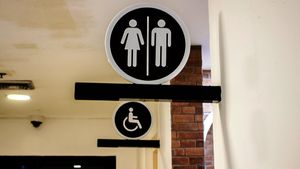Editor's note: Rateb Y. Rabie, KCHS, is the founder and president of the Holy Land Christian Ecumenical Foundation (HCEF), a nonprofit organization supporting Christian communities in the Holy Land. He was born in Jordan to Palestinian parents, and now lives in Maryland, US. The views expressed in this commentary are his own. Read more CNN Opinion.
(CNN) — The iconic occupied Palestinian territories’ city of Bethlehem will undergo a profound departure this year from its usual jubilant atmosphere.
For Palestinians, Christmas in Bethlehem represents a window to the world. It has long been synonymous with joy and hope, and an occasion to commemorate the place of birth of the Christmas story itself.
Picture the vibrant streets adorned with festive lights, the air filled with the melodies of choirs and boy scouts parading with their musical instruments, while those who are celebrating taste traditional Palestinian Arabic food.
Nestled in the heart of Bethlehem is the place revered as the birthplace of Jesus, the prince of peace.
This year, however, there will only be a shadow of the dazzling Christmas tree in Manger Square, where Christians, Muslims and visitors from around the world usually gather to celebrate.
Bethlehem will stand dark and deserted – a poignant reflection of the suffering endured by the Palestinian people, particularly in the Gaza Strip.
Earlier last month, the Patriarchs and Heads of Churches in Jerusalem called on their congregations to forgo the customary celebrations, while still upholding the religious and spiritual aspects of Christmas.
This departure from tradition was not an easy decision, as church leaders grappled with the difficult choice of canceling the festivities in the occupied Palestinian territories, Jordan and Israel.
Bishop William Shomali, the General Vicar and Patriarchal Vicar for Jerusalem and Palestine of the Patriarchate of Jerusalem, emphasized the somber mood behind the decision. “How can we celebrate Christmas when thousands of Palestinians got killed and injured and thousands of houses were destroyed in Gaza?” he told me.
“The same atmosphere of sadness prevails for the Israeli civilian losses. It is time for compassion and solidarity, not for joyful and worldly celebrations,” he added.
The reality is stark. Since October 7, over 16,000 Palestinians have been reported killed as a result of Israeli attacks, while 42,000 others bear the impacts of injury.
Of those killed, 70 percent are children and women. Thousands of homes lie in ruins, displacing 1.7 million people who now grapple with the harsh realities of life virtually without electricity, fuel, fresh water, food and medicine.
These devastating statistics – sourced from the Ministry of Health in Gaza – highlight the human cost of the conflict that has persisted since the Israeli occupation 56 years ago.
Gaza’s small Christian community is no exception to the most recent destruction. When I recently spoke by phone with Sister Nabila Saleh of the Rosary Sisters in Gaza, she described her pain as she told me that 53 households were destroyed and 19 Palestinian Christians of the approximately 1,000 remaining Christians in Gaza had been killed.
While this Christmas void will resonate as a tragedy for Palestinians, Christmas in Bethlehem is not just a religious event. It is a day of national significance, fostering cooperation and unity between Christians and Muslims living in Palestine as well as between them and religious communities abroad.
Each year, thousands of pilgrims make their way to Bethlehem, gathering as a beacon of peace, reconciliation and togetherness and sending a powerful message to the world.
Wretchedly, the Israeli occupation has significantly impacted religious tourism in the Holy Land for decades, especially in Jerusalem and Bethlehem. Hotels now remain empty or closed, souvenir shops are shut down, and consequently, unemployment is high.
Exacerbated by the war in Gaza, the decision to cancel the Christmas festivities this year will have a profound impact on Bethlehem’s economy, which is 90 percent dependent on tourism. In times of crisis and adversity, we turn to the words of Psalms 34:18, which remind us that: “The LORD is close to the brokenhearted and saves those who are crushed in spirit.”
This psalm resonates with all of us Christians as we hope for a swift end to suffering and a prayer for justice amid adversity. It is worth noting that Palestinian Arab Christians hold a crucial role as natural bridges to peace. Rooted in the same aspirations, culture, history and language as Palestinian Muslims, they also share a history of faith with Jews.
This uniquely positions them to connect with diverse communities and to serve as catalysts for dialogue and understanding between Muslims and Jews and on a broader level with the support of Western counterparts.
As the Christmas season approaches, the absence of festivities in Bethlehem serves as a poignant reminder of the urgent need for a lasting peace. This Christmas presents a special opportunity to shed light on the struggles faced by Palestinian Christians, Palestinian Muslims, and Israeli Jews alike, with the hope that renewed focus and dialogue will pave the way for a path to reconciliation.
In a recent telephone conversation, Archbishop Atallah Hanna of Sebastia from the Greek Orthodox Patriarchate of Jerusalem told me that “canceling the Christmas festivities and the spiritual meaning of Christmas are both a message to the world that the suffering people of Gaza need peace, justice and humanitarian assistance.” He continued, “It’s a call for a ceasefire now. Pray with me for the innocent victims.”
In a world where divisions often overshadow common ground, Christmas in Bethlehem remains a symbol of hope, one that transcends borders, religions, and conflicts.
As we navigate these challenging times, let us reflect on the message of Christmas and strive for a future where the streets of Bethlehem, once again, resound with joyous celebrations of peace and unity.
The-CNN-Wire
™ & © 2023 Cable News Network, Inc., a Warner Bros. Discovery Company. All rights reserved.
Israel resumes bombing in Gaza

Video Source: Advocate Channel
- Israel Has Arrested Almost as Many Palestinians as It Has Released During the Truce ›
- Queering the Map in Gaza: LGBTQ+ Palestinians Pay Tribute to Deceased Loved Ones ›
- Disabled Palestinians Struggle to Survive in Gaza: 'Isolated From the World' ›
- Here Are Ways You Can Help Palestinian Civilians That Aren't Just Donating ›


















































